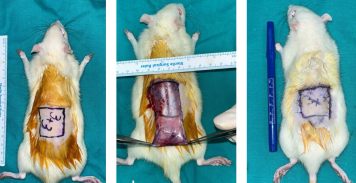Effect of topical nitroglycerin on neoangiogenesis and pedicle-independent viability in a rat dorsal skin flap model
DOI:
https://doi.org/10.17305/bb.2025.12781Keywords:
Flap autonomization, topical nitroglycerin, interpolation flaps, angiogenesis, rat flap modelAbstract
Interpolated flaps are frequently used in reconstructive surgery when free tissue transfer is not feasible, but they require staged procedures due to pedicle dependence. Flap autonomization, the process by which transferred tissue develops new vascular connections and survives independently of its pedicle, is essential before division. Although methods such as delay techniques, hyperbaric oxygen (HBO), vascular endothelial growth factor (VEGF), and stem cell therapies have been tested to enhance angiogenesis, the effect of topical nitroglycerin (NTG), a nitric oxide (NO) donor with vasodilatory, anti-inflammatory, and angiogenic properties, has not been investigated. This study aimed to evaluate the effect of topical NTG on neoangiogenesis and flap autonomization in a rat dorsal skin flap model. Sixty Wistar-Albino rats were divided into five groups (n = 12). A 3×3 cm dorsal flap with a caudal pedicle was elevated in all animals. In Groups 1–3, pedicles were transected on day 5: Group 1 received vaseline, Group 2 received NTG for 5 days then vaseline, and Group 3 received NTG continuously. Groups 4 and 5 were sacrificed on day 5 to assess early angiogenesis after vaseline or NTG. Flap survival was analyzed with ImageJ, angiogenesis with VEGF, CD34, and CD105 staining, and histology with Hematoxylin and Eosin (H&E) and Masson’s Trichrome. Flap survival was significantly greater in Groups 2 (485.5 mm²) and 3 (757.3 mm²) than in Group 1 (273.5 mm²), with Group 3 highest (p < 0.01). NTG-treated groups showed increased VEGF, CD34, and CD105 expression, with the strongest angiogenesis in Group 3. Group 5 also had higher vascular proliferation than Group 4 (p < 0.001). Histology showed that NTG reduced epithelial disruption, hemorrhage, collagen degradation, and leukocytic infiltration while enhancing vascular proliferation. In conclusion, continuous topical NTG enhanced angiogenesis and accelerated flap autonomization, leading to greater viability after pedicle division. NTG may help shorten pedicle division intervals and improve outcomes in reconstructive surgery, but further molecular and clinical studies are needed.
Citations
Downloads

Downloads
Published
Issue
Section
Categories
License
Copyright (c) 2025 Oğuzhan Karakoç, Selman Hakkı Altuntaş, İlkay Armağan

This work is licensed under a Creative Commons Attribution 4.0 International License.









